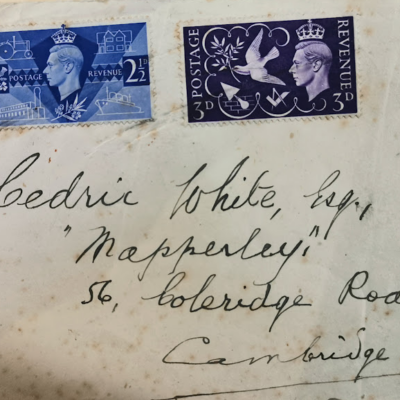Search by topic
- archaeology
- Building of Local Interest
- charity
- church
- crime
- dressmaker
- fire
- Great Eastern Railway
- Listed building
- Mapping Relief
- medieval
- oral history
- poverty
- Public House
- Rattee & Kett
- Religious House
- Roman
- scholar
- school
- Then and Now
- tudor
- women
- work
- world war one
- world war two
Search by text
72 Coleridge Road
A private library like no other
In the late sixties, anyone walking by this quiet, suburban semi-detached house would have double-took as they glanced over at the bay-windowed frontage. They might have stopped momentarily to comment or wonder at the number of books that could be seen, dimly lit beyond the open curtains. From floor to ceiling, they lined the walls, spine-out on groaning shelves. In the days when the wall-paper of most front rooms in Coleridge Road was more likely to be decorated with a framed picture or two, or some porcelain ducks, this was clearly no ordinary home.
Number 72 Coleridge Road was well known to local residents during the fifties and sixties. it was the home of Dr Reinhold Regensburger, academic, refugee and book collector extraordinaire. By the time of his death in 1972, aged eighty-one, Regensburger had created the largest accessible private library in the country. ‘His thirst for knowledge was unique and unquenchable,’ commented one colleague in his obituary.
Dr Regensburger’s obsessive book collecting began when a young man in his native Germany and he quickly amassed a sizable collection. He travelled extensively and worked as a lawyer and linguist in Berlin during the twenties and thirties, but when the Second World War started, over 17,000 volumes from his collection were confiscated and Regensburger fled to Cambridge as a Jewish refugee. He settled in the quiet suburb of Coleridge Road and trained as a librarian. During the war he briefly acted as sub-librarian at Trinity College – a post secured on the recommendation of none other than Albert Einstein. When that job ended in 1947, Regensburger devoted his life to his personal library, supplementing acquisitions with occasional teaching work. In the late fifties he founded the Private Libraries Association (PLA), for book collectors everywhere.
An article in the PLA’s journal described his extraordinary house, which contained tens of thousands of volumes stored on a quarter of a mile of shelving – some achievement in a small three-bedroom house – all catalogued according to Regensburger’s own classification system. Subjects ranged from theology to history, science to classical works, covering many languages. Every book, it was said, was read in its entirety, with cross-references noted. ‘It may claim to be the finest guide to human knowledge stored on open access in a single private house.’
His residence at number 72 was effectively converted into a working library. Dark wooden shelves lined every room. The floor was covered in a soft rubber, apparently to avoid dust, and the curtains were of ‘a washable plastic material’. The study gave ‘an immediate impression of devout scholarship’. The kitchen was kept relatively free of books but otherwise the ground-floor was filled with them, divided into sections, as any library might be. The department of English culture, it was reported, was stored in the dining room. A ‘lift’ or small cabinet was used to transport books upstairs, where many more were shelved. ‘Here again the passages are utilised imaginatively and one wall of a bedroom provides more vital shelf space.’ The vast German-language collection was described as ‘probably second only in size and quality’ to that in the British Library. ‘That one man should have assembled such a balanced stock is truly astounding.’ The views of his wife Maria, whom Regensburger married in 1948, was not recorded.
Although this was a private library like no other, Regensburger was also very happy to share his knowledge and his books. His home was always open to visitors who wished to study there. Appointments required three days’ notice. On his death in December 1972, his unique collection was bequeathed to the library of the Hebrew University in Jerusalem.
Rob Webb, 2022
Contribute
Do you have any information about the people or places in this article? If so, then please let us know using the Contact page or by emailing capturingcambridge@
License
This work is licensed under CC BY-NC-SA 4.0






